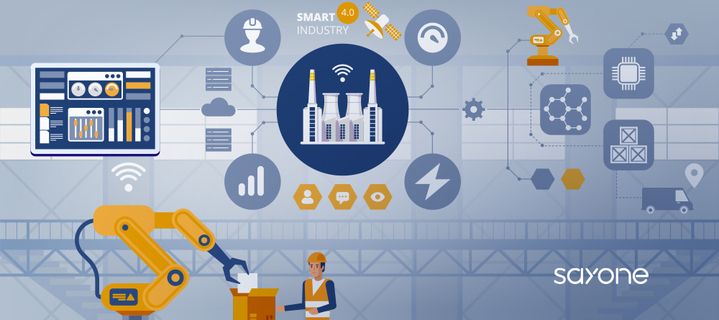
Subscribe to our Blog
We're committed to your privacy. SayOne uses the information you provide to us to contact you about our relevant content, products, and services. check out our privacy policy.

Real PradJune 16, 20237 min read

Generating table of contents...
IoT is disrupting every walk of our life. In this new age of connectivity, IoT enables devices and machines to communicate with one another to make the environment more productive as well as efficient. IoT has also enabled a great deal of automation in the industrial sector and because of this, there is more automation in industrial processes. This has further allowed businesses to optimize processes leading to savings in resources and a cut in costs. Also, this has helped to increase the safety and security of industrial processes.
In this article, we attempt to explain how IoT has changed the operations of numerous industries and how operations have changed drastically. Also, we examine the benefits, difficulties, and potential developments of IoT in industrial automation in the future.
IoT-based industrial automation has benefited the manufacturing sector in many ways. Some of them are discussed in the following paragraphs:
When equipment and machines are connected and can interact with one another and also share data in real-time, there is likely to be a significant advancement. This helps to improve collaboration between connected systems and processes, leading to quicker and better-quality decisions.
Predictive maintenance is but one of how IoT has served to improve efficiency and production in industrial automation. Machines and equipment with IoT sensors track their performances and help to predict when they can break down.
This arrangement helps to reduce downtime and ensures that the machines always operate in a high state of efficiency by enabling businesses to schedule maintenance before any issue arises.
A big advantage is that connected IoT devices and sensors collect large amounts of data from machines and processes. This data can then be analyzed to gain valuable insights and thereby improve decision-making.
Read our blog: The Role of IoT in Mobile App Development
The decision-making gets better because IoT facilitates access to real-time production data for the producers. This will help companies quickly identify and address any issues that show up when they track and analyze data from machines and devices. These actions will serve to reduce the overall waste of resources and boost productivity.
Modern techniques like AI and machine learning can be combined with IoT data to study patterns and insights that emerge and would be otherwise challenging or impossible to spot when the operations are manual. This makes businesses better equipped to forecast future demand, optimize production schedules based on this demand, and also find fresh growth prospects.
When IoT sensors are installed on machinery and equipment, it allows for performance monitoring and failure prediction to become easy. This helps businesses plan maintenance and repair schedules ahead of time than wait for a machine to break down.
This type of proactive maintenance method causes machines to break down less because maintenance sessions are built around their production schedules, thereby minimizing operational disturbances.
IoT allows for remote monitoring and control of equipment, and this allows businesses to recognize and resolve any issues even when off-site. Downtime is further reduced because problems can be addressed quickly as well as remotely.
IoT in industrial automation results in improved safety and security. This is made possible by offering real-time monitoring and management of both equipment and procedures. Organizations can identify and handle risks by gathering and analyzing device data continuously.
IoT sensors can be able to monitor environmental factors such as temperature, humidity, and gas concentrations. This can help to warn organizers/operators so that accidents can be avoided and workers' safety protected.
The improvements in industrial automation have been due to the different applications of IoT. Some are described in the following paragraphs.
Predictive maintenance is set up to track the quality of equipment using sensors, smart devices, and analytics and its performance in real-time and spot possible issues before they occur. This helps in proactive maintenance rather than reactive maintenance and helps to cut and reduce maintenance expenditures and equipment downtime.
IoT technologies can be set up to improve and optimize manufacturing processes. IoT connectivity solutions transmit data from the sensors connected to the machines and the cloud. This data flow uses both wired and wireless communication and allows monitoring and managing processes remotely to instantly alter production schedules in real time.
IoT technologies can help to improve supply chain management by providing more visibility into inventory levels, shipping statuses, and other information. Companies can monitor the progress of the transhipment of their products along the supply chain, from the manufacturer to the end customer.
Download our ebook for free: Global Software Development Rates: An Overview
IoT helps to improve logistics and transportation management. IoT-enabled sensors fitted on vehicles can collect location data, fuel consumption, etc., which can be used to optimize routes, further reduce fuel consumption, and improve delivery intervals.
IoT devices and sensors can be set up to improve quality control and inspection in industrial automation to collect data in real time. This data is analyzed to identify any issues in the manufacturing process and ensure that products meet the required quality statuses.
Future trends and developments in IoT automation
The IoT technology has the potential to revolutionize industrial processes and introduce automation to high levels. Real-time monitoring and control of machines and processes, collection and analysis of data, can help to increase efficiency, safety, productivity, and security in industries.
Looking for web or mobile app development services? Get in touch for a free consultation! from our Experts.

We're committed to your privacy. SayOne uses the information you provide to us to contact you about our relevant content, products, and services. check out our privacy policy.

About Author
Co-founder and CEO at SayOne Technologies | Helping startups and enterprises to set up and scale technology teams- Python, Spring Boot, React, Angular & Mobile.

We collaborate with visionary leaders on projects that focus on quality